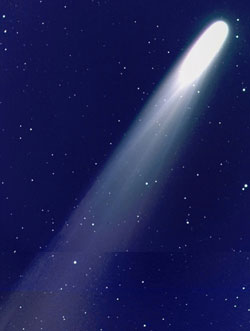 Something else we need to worry about came up this week at a meeting of the world's top scientists in San Francisco. Apparently there is an asteroid named Apophis, a big chunk of space rock the size of a couple of soccer pitches, hurtling towards us at breakneck speed. Right now it's way out there in space, but there's a chance that it might hit us.
Something else we need to worry about came up this week at a meeting of the world's top scientists in San Francisco. Apparently there is an asteroid named Apophis, a big chunk of space rock the size of a couple of soccer pitches, hurtling towards us at breakneck speed. Right now it's way out there in space, but there's a chance that it might hit us.
Scientists even know the date-13 April, 2036. That's not BS, so we have time to get all lathered up with worry, to waste reams of time wondering what to do, and perhaps start spending public money on fending off Apophis. Already there's talk of a space mission to divert or destroy our cosmic invader.
Now I don't take any of this seriously for a moment. The chances of Apophis smashing into us are pretty remote. We'll get hit by a big space rock at some point, but it could be another thousand years or so. Or it could be tomorrow, one we didn't see coming.
That got me thinking, always a dangerous thing. What throws our well made plans into mayhem, mocks our penchant to prepare? The unexpected, that's what. Just when you think you've come up with a cure for all the horrible diseases that plague developing countries, a new, mutated strain of, say, the common cold wreaks havoc. A consensus on climate change that leads to real reductions in greenhouse gases could be rendered insignificant by a big volcanic eruption somewhere. Or indeed, a celestial object smashing into Earth and blacking out the sun with plumes of dust.
Here in Nepal, everyone puts their energies into peace, driven along by international donors who seemed to believe that peace was an end, rather than a means. And what happens? All these pesky demands for inclusion, and the formerly warring parties laying down their arms and emerging waving into public space only to be greeted by outstretched palms and a long list of what's lacking. That's a recipe for political paralysis.
But Nepal needs to be wary about more than the current peace process. The unexpected lurks. To paraphrase the departed and barely-missed Donald Rumsfeld, there are unknowns we know about, and unknowns we don't know about.
The former category includes almost any political grievance that hasn't yet popped up and isn't obvious. Say the people of Mustang get uppity and want independence, or something like that. It also covers earthquakes which should be a constant topic of discussion and debate in Nepal but isn't. A big series of tremors hitting the country sometime in the next century or so is far more likely than a visit from our space friend Apophis.
And then there are the unknowns we don't know. Epidemic disease, water shortages, a massive world wide computer failure that throws everything into a tizzy. Nepal is more global than its blinkered elite believe. Anything that causes catastrophe on a grand scale will hit hard in the Himalayas and tarai alike. There are plenty of possibilities.
There's not much we can actually do about any of those things. What we can do is prepare to survive disasters like earthquakes. We can agitate for better public health systems. We can conserve water and cut down on greenhouse gases but we should be doing all these things already. Let's start with them and move on to our unknown unknowns later.



